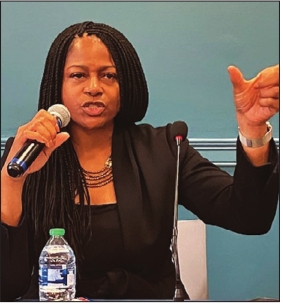
Dr. Bisola Ojikutu speaking during the RCC Health Forum. Top executives, health officials say they need to do more
Health care institutions have a collective responsibility to address disparities among vulnerable Black and brown people, but the institutions have been mired in a lack of cohesion and sustained progress and have made little dent in eradicating health care inequities.
Those assessments, aired during a daylong convening at Roxbury Community College on Saturday, offered a sharp critique of the shortfalls that have exacerbated gaps in health care, particularly in marginalized communities.
The panelists, which included hospital executives, public health officials and other top health care officers, made their points as RCC marks its 50th anniversary with a focus on mental, physical and emotional health.
The forum comes as health providers are coming to terms with the disparities exposed by the COVID-19 pandemic. At Saturday’s event, speakers urged the public to harness their own power to push for what they need.
“We have power, we have agency and we need to use it. It has to come from us. They’re not going to make any changes without pressure,’’ said RCC President Jackie Jenkins-Scott. “We continue to have to recognize that these issues are tough and they’re complicated. And when we talk about systems … we’re really talking about people. We have more power than we think.”
The panelists pointed to a range of issues that have kept the health gaps wide open. They said hospitals aren’t collaborating as they should, that critical changes that benefit marginal communities are not sustained over time, and that health care is mired in outdated practices that have not caught up with the times.
Dr. Bisola Ojikutu, executive director of Boston’s Public Health Commission, was asked why the city has not made enough progress on health disparities and outcomes. While she did not answer the question directly, she did urge more discussions around making health care centered first in the local communities rather than at the major hospitals.
“It doesn’t begin in hospitals or clinics, it begins in our neighborhoods, in our communities. It begins in our families,’’ Ojikutu said. “And that’s where interventions are missing. … The community investment piece, the pieces that we have not done enough of, [are] missing.”
Ojikutu said Boston has enormously impressive institutions that are not effectively collaborating on things like raising life expectancy in the Black community and reducing problems like obesity and hypertension. Solutions need to involve communities, she added.
“We’re not working to tackle this together and … let the community lead in terms of what the solution should be,” Ojikutu said.
Kevin Tabb, president and chief executive of Beth Israel Lahey Health, said that Black and brown communities should use their collective power to persistently push their hospitals and other health institutions to do more than they are currently doing — or have done.
“We will have more of an effect,” he said, if strong communities continue to “hold our feet to the fire.”
Tabb said that health care institutions are more ready now than they were in the past to engage with the community, but worries that changes made toward this path are not sustained, and the institutions often fall back on old behaviors.
Alastair Bell, president and CEO of Boston Medical Center Health System, said that thinking about new ways to improve the health care model or how to deliver care is transformational.
“It takes leadership, people like myself and others … to do the work of meeting the community where they are [and] helping translate community ideas into stuff that’s replicable into the health care system,” Bell said. “We have to help you translate your ideas into [ways] that will work more broadly within this system, and then pour into all of the systems that we have to deliver different outcomes.”
Institutions must also look internally to ensure they have a diverse pool of practitioners, the panelists said.
Dr. Claire-Cecile Pierre, vice president of community health programs at Mass General Brigham, said health care institutions must be intentional about aligning better with the communities they serve, including hiring a diverse staff. As an example, she pointed to Mass General Brigham’s effort to unite against racism two years ago.
“That meant for us that we could set clear numbers and clear measures that we held ourselves to, in terms of who we hire ... who we keep and who we promote,’’ Pierre said. “What we don’t want is what we see a lot in health care systems, [and that is] people who look like me [who] are only in certain roles. They are not in roles where decisions are being made.”
Dianne Wilkerson, former state senator and the panel discussion’s moderator, said the panel did not come to defend the status quo.
“This panel started off saying, ‘Yeah, we didn’t come to defend it. We have to fix this, and we know that it’s not working,’” Wilkerson said. “We knew from the beginning … we were going be off to a good start — and I think that the goal was accomplished.”